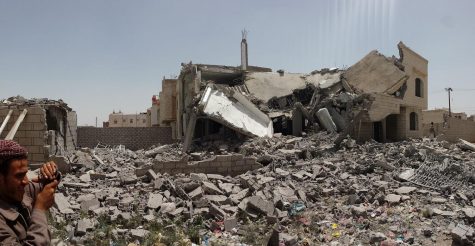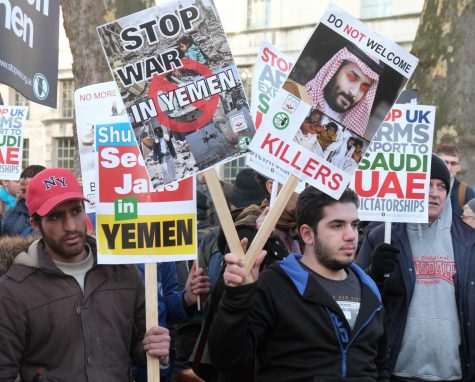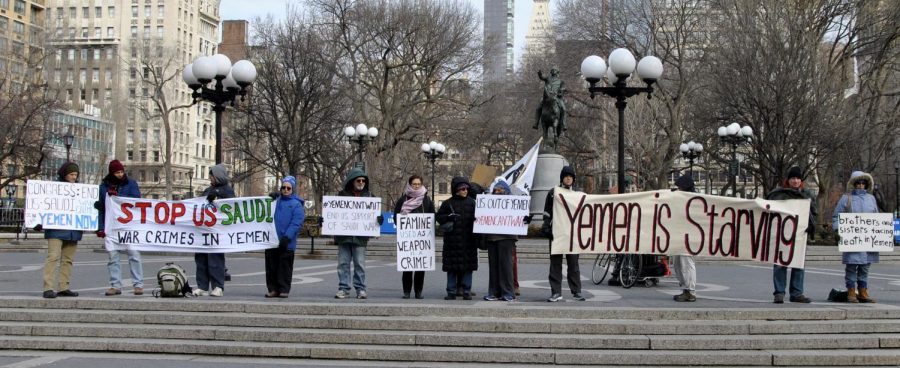Let the murder of Khashoggi end the war in Yemen
In an effort to rebuke President Trump’s handling of Saudi journalist Jamal Khashoggi’s murder, the Senate has garnered support voting on a measure to end U.S. support for the Saudi-led campaign in the war in Yemen. After 10,000 deaths and 85,000 children under-the-age-of-five starving to death, the question remains, ‘What took so long?’
December 17, 2018
(12/12/18) “There is not a smoking gun – there is a smoking saw.”
No, Senator Graham, there is a smoking bomb – and it’s American made.
Three years into the brutal war in Yemen and Congress is finally taking action. The Senate’s rebuke of President Donald Trump’s cowardice in the murder of Saudi reporter Jamal Khashoggi must not be confused for a sudden epiphany of Congressional morality.
The Senate Committee on Foreign Relations was briefed by the CIA on the complicity of Saudi Crown Prince Mohammed bin Salman in ordering Khashoggi’s murder. Speaking to reporters after, Sen. Lindsey Graham (R-S.C.) announced he wouldn’t support Saudi Arabia’s war efforts in Yemen or continued arms sales from Washington as long as the crown prince remained in power.
“If you want to buy our weapons and integrate your economy into ours, there’s a certain price to be paid. Don’t chop somebody up in a consulate. That’s not too much to ask,” said Graham.

Saudi journalist Jamal Khashoggi was a vocal critic of the Saudi-led campaign in Yemen. He called for a reckoning from Saudi agression in the region and warned of the repercussions such human rights abuses could incur
Senate discontentment of Trump’s inaction was displayed by the bipartisan advancement of “The Yemen Resolution” to withdraw American support for the Saudi-led coalition fighting in Yemen. A further floor debate will take place before being passed to the House where it is certain to fail until the arrival of the new Democratic majority in January.
“It’s time to send Saudi Arabia a message, both on its violation of human rights and the incredible humanitarian catastrophe it’s creating in Yemen,” said Sen. Bob Menendez (D-N.J.).
If preventing a humanitarian catastrophe upholds American values, why aren’t American defense contractors like Lockheed Martin, Boeing and Northrop Grumman held in the same murderous light as the Saudi crown prince?
Yemenis represent the Arab world’s most destitute citizens, yet for American arms suppliers, their nation’s further destruction represents an opportunity more lucrative than the richest oil fields in the Middle East.
The war represents the continued struggle for political representation and self-determination in the wake of the 2011 Arab Spring uprisings.
Fearing the spread of Iranian influence, a Saudi-led coalition of mostly Sunni nations have used Western-sold weapons to brutalize the Iranian-backed Houthi rebels who seized power in a 2015 coup.
Turning the Houthi struggle against rising unemployment, horrific healthcare and lack of public funding into a proxy war for regional hegemony, the Saudi-led coalition has made an art form of turning Yemeni civilians into forgotten collateral damage.
According to the United Nations, over 10,000 civilians have been murdered in Yemen, with a further 40,000 injured since the start of the war. Due to the difficulties of reporting, the numbers are most likely significantly higher. A total of 56,000 people have been killed resulting from the ceaseless fighting, displacement, disease and starvation. Over three million civilians have been displaced and 24 million Yemenis will require humanitarian assistance in the coming year. A further 14 million people are on the brink of famine.
The nonprofit Save the Children estimated 85,000 children under the age of five have perished from acute malnutrition. Exacerbating the crisis, a cholera outbreak instigated by destroyed water infrastructure has affected 1.2 million Yemenis.
Every aspect of this preventable humanitarian crisis has been manufactured and caused by the excesses of human greed.
Trump expressed his disdain for the possibility of Congressional action against Saudi Arabia for the murder of Khashoggi.
“I know they’re talking about different kinds of sanctions, but (Saudi Arabia is) spending $110 billion on military equipment and on things that create jobs,” said the commander in chief.
In May, Trump, at the beset of defense contractors, brokered a $350 billion arms deal with the Saudis over 10 years with no specific human rights conditions attached. Saudi Arabia has since followed through on $14.5 billion in purchases.
Trump’s deal overturned an Obama-era embargo enacted after Saudi planes intentionally dropped American-made bombs on a Yemeni civilian funeral reception, killing 140 civilians and severely injuring over 500 people.

Saudi warplanes have utilized a strategy known as ‘double-strike bombing.’ After help and rescuers rush in to save people after an intitial bombing, the planes circle around and drop a second bomb to maximize casualties
Through the targeting of a civilian funeral and the Saudi bombing of 274 medical facilities, Congress remained conspicuously silent.
Little than four months after Trump overturned Obama’s executive action, a resilient Yemeni child named Buthaina was fighting for her life, eyes swollen shut from bomb-induced trauma.
On August 25, Buthaina’s home in Sana’a was struck by a U.S. laser-guided precision missile. Sixteen people were killed, including seven children and Buthaina’s entire family. As Saudi officials blamed the strike on a technical error, Congress again remained conspicuously silent.
Her swollen eyes came to represent the world turning a blind eye to the atrocities happening against the Yemeni people.
Amongst overwhelming evidence, Congressional leaders have pleaded ignorant to war crimes perpetrated against the world’s most desperate and vulnerable citizens. However, ignorance does not excuse you from the burden of complicity.
While the U.S. has provided logistical, intelligence and arms support to the Saudi-led coalition, the UN has accused both the coalition and the Houthi rebels of committing war crimes.
A report by the UN Office for Human Rights documented attacks on residential areas, use of illegal landmines and cluster bombs, sniper and drone attacks against civilians, illegal detentions, civilian assassinations, the recruitment of child soldiers, forced evictions and civilian displacement.
Researchers have risked their lives painstakingly investigating bomb sites, collecting bomb fragments, citizen testimonies and corroborating evidence to build cases of war crimes against the perpetrators.
Amnesty International has collected evidence on 34 individual airstrikes in which 494 Yemeni civilians were murdered, including 148 children. The majority of these airstrikes were carried out using American and British-manufactured weapons. Amongst the weapons were cluster bombs, prohibited by the Geneva Convention, which are left as unexploded munitions on the ground, waiting for children or other civilians to make contact with before exploding.
There is a Congressional mandate against the use of cluster bombs near civilians or civilian habitation, but constitutionality always comes second to the feeding of America’s voracious military-industrial complex.
Such unwavering Congressional support should not be overlooked when considering the Senate’s recent measure to advance the Yemen Resolution. Their political maneuvering is only a gambit to hedge the possibilities of the upcoming peace negotiations between warring sides brokered by the UN in Sweden.

Anti-war protestors hope to drown out the call from defense contract lobbyists who urge the Trump Administration to continue support for the Saudi-led campaign in Yemen. The war has provided them the unique oppurtunity to maximize profits with little congressional oversight
Past failed negotiations indicate the suffering of the Yemeni people will continue. However, on the possibility of peace, Congress looks to ensure they come out on the right side of history. Voting “yes” on the measure makes them look tough where Trump has failed on Khashoggi and makes them look empathetic to the plight of the Yemeni people.
Since the Khashoggi murder, Germany and Norway have suspended arms exports to Riyadh. U.S. Senators who have openly supported Saudi coalition efforts have seen the tide of momentum begin to shift. Every resource market contains a bubble, and profiteering off the ravaging of Yemen appears ready to burst.
The legacy of the war in Yemen will not be a return to regional stability or a suppression of extremist forces in the volatile region. The war will be remembered for rampant capitalistic and imperialistic tendencies disfiguring morality with a price on the body of each innocent Yemeni civilian.
The war will be remembered for hegemonic forces turning a fragile and vulnerable state into the worst humanitarian disaster of our lifetime.
It will be remembered for the unspeakable cruelty of the Saudis blockading the ports of Aden and Hudaydah, preventing food and medical aid from reaching desperate civilians. It will be remembered for starvation and cholera, induced by the asphyxiation of clean water sources, being weaponized as a way to intimidate and destroy the resilience of the Yemeni people.
According to Sen. Graham, there are conditions that need to be met in order to purchase American made weapons. After three years of hell for the Yemeni people – What exactly are those conditions?
The Saudi crown prince has consolidated power by persecuting his opponents and terrorizing dissidents. He feels impervious to retribution and will continue acting with impunity unless international pressure forces a change of action or a change of command.
However, American complicity in the Saudis’ war crimes in Yemen cannot be overlooked. The contributions of Congressional war hawks and profiteering defense contractors cannot be forgotten.
Impunity ends when individuals are tried for the crimes they perpetrate. Only by dismantling the war machine piece by piece can justice be brought to the murdered civilians in Yemen.
Writing for the Washington Post before his dissenting voice resulted in his murder, Khashoggi described the conflict in Yemen as being the result of denying people from rightfully “achieving their desire for freedom.”
“The longer this cruel war lasts in Yemen, the more permanent the damage will be. The people of Yemen will be busy fighting poverty, cholera and water scarcity and rebuilding their country,” he wrote in the conclusion of his Sept. 11 article.
If Congress truly cares about seeking justice for the murder of Khashoggi, they need to stop manipulating the fates of the Yemeni people as a political pawn and do the right thing.
Trump is not an obstacle to ending the forced starvation and indiscriminate killings of the Yemeni people; he’s the inevitable product of America never facing an atonement for its insatiable capitalistic avarice.
And so the war carries on…


















